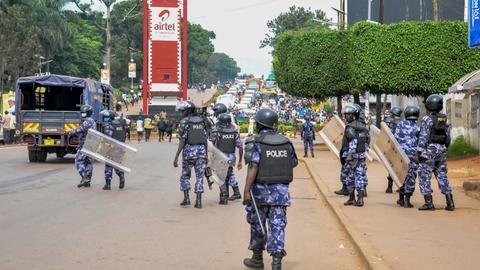Ugandan Police to Continue Dispersing Illegal Assemblies Despite Court Ruling.

The police in Uganda have stated that they will persist in dispersing illegal assemblies, despite the recent nullification of certain sections of the Public Order Management Act (POMA) by the Constitutional Court.
Last week, the Constitutional Court made a ruling stating that Sections 5 and 10 of the POMA (Public Order Management Act) are unconstitutional and invalid because they impose criminal penalties on individuals who organize or participate in peaceful public gatherings, such as protests or assemblies.
In response to the ruling, Fred Enanga, the spokesperson for the Police, stated that although Sections 5 and 10 of the POMA were declared unconstitutional, the police still have the authority to prevent or disperse unlawful assemblies under the Act.
“For purposes of policing public meetings, assemblies and processions, the most important section in the Public Order Management Act 2013 is section 5 and is still intact. This section provides for organisers of the public meeting to organizer police three days before the date of the meeting, assembly or procession. Organisers, individuals and political groups should know that although it is a fundamental right to peaceful assembly, they also have a duty to inform police,” Enanga said.
The police spokesperson clarified that under this particular section of the law, those responsible for arranging gatherings, meetings, demonstrations, and parades are required to give notice to the police of the scheduled date and time, along with details about the event, information about the organizers, permission from the venue owner, expected attendance figures, purpose, and other essential information.
He mentioned that the police have always required additional criteria such as having a plan for managing traffic, enough stewards to assist with crowd control, and working closely with the police to ensure security measures are in place. He emphasized the importance of following these guidelines as well.
“It doesn’t mean that the police don’t have powers to police or regulate unlawful assemblies. The law provides for the regulation of unlawful assemblies under the Penal Code Act and for that matter, under section 65 it still provides what an unlawful assembly is. We therefore have powers to disperse any unlawful assemblies and riots.”
He stated that Section 68 of the Penal Code Act outlines the procedure for dispersing rioters, which can be carried out by a magistrate or any police officer with the rank of inspector or above, as well as any commissioned officer in the armed forces. If the officer observes that there are 12 or more people gathered in a riotous manner, they have the authority to issue a proclamation and disperse the assembly.
In 2019, the Constitutional Court ruled that Section 36 of the Police Act was unconstitutional because it allowed the police to use excessive force against innocent citizens.
In 2020, the Constitutional Court invalidated Section 8 of the Public Order Management Act, which gave the Inspector General of Police the authority to prohibit public assemblies.
Opposition groups and the general public have accused the police of using the Public Order Management Act as a pretext to suppress opposition and disrupt their demonstrations.
What's Your Reaction?























































